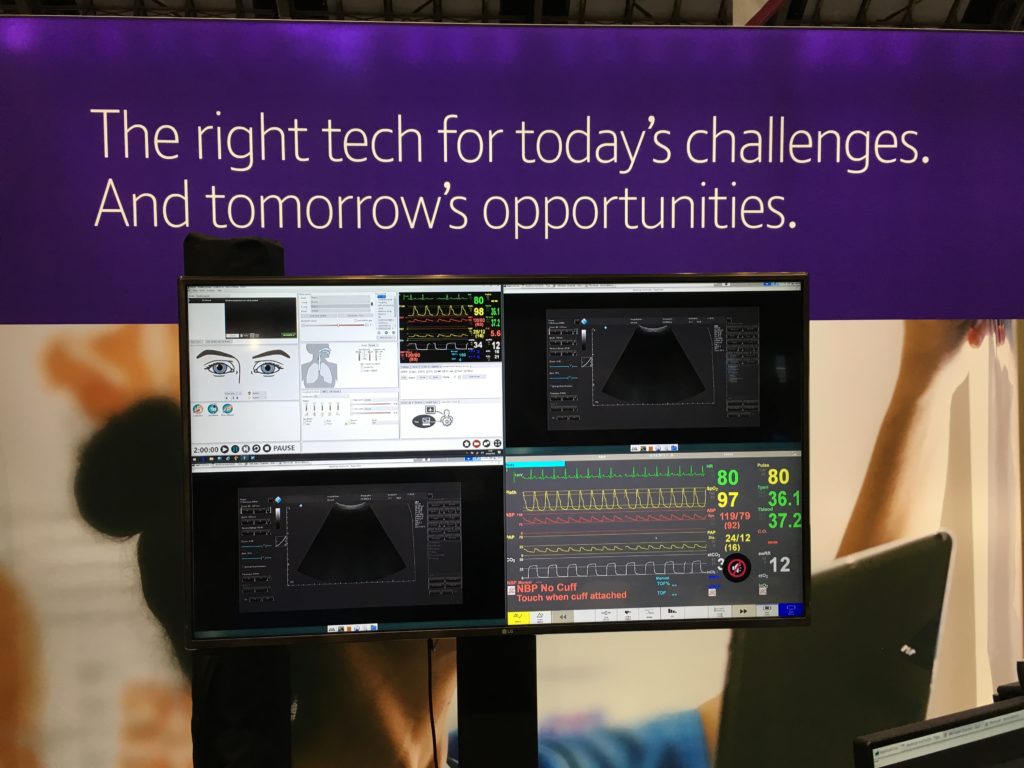NHS Expo – AI, mental health, and progressing the Long Term Plan dominate talks at top NHS event
Written by Rebecca PaddickLast week saw Manchester Central host the biggest NHS-led event of the year. Focused on the Long Term Plan, Expo unites more NHS, local government and social care leaders than any other health and care event.
At the main arena and forum stages, we heard from leading healthcare figures, such as Matthew Gould, CEO for NHSX, Simon Stevens, NHS Improvement Chief Executive, and even Matt Hancock (albeit, this was a simple, pre-recorded video, as Matt was too embroiled in yet another Brexit debate to make the trip up North.)
Stronger prospects
Simon Stevens’ talk drew the biggest crowds, where the Chief Exec said that the prospects for the NHS over the next five years are stronger than they were this time last year, thanks to the Long Term Plan now firmly in place. However, he went on to say that: “There are things we still need to get right and there are things we need from The Government. We need strong, multi-year capital settlement to invest in infrastructure and diagnostics, building on the kinds of progress we’ve seen in AI.”
But, still in the dark ages
National chief clinical information officer Simon Eccles gave a powerful speech about how the NHS is still living “in the dark ages” when it comes to tech. He said that other industries, such as agriculture and shipping, have made “phenomenal leaps” towards digitisation. He stressed that more money needs to be invested into technology across Trusts to bring them up to speed.
“We are spending less than 2% in many of our organisations on our full digital infrastructure and technology.”
AI all the way
Eccles also revealed a few snippets of what to expect from the £250m Artificial Intelligence (AI) Lab, announced by The Government in August. The lab, which will be run by NHSX and is due to be launched in April 2020, will be used help to develop treatments for cancer, dementia and heart disease.
Eccles said that it will focus on taking examples of AI in healthcare and “rigorously testing” them to find out whether they can deliver scalable benefits to the NHS.
NHSX recap
Considering this event was centred around innovation in healthcare, Matthew Gould’s talk, called: NHSX – a better eXperience, failed to reveal any new details on the initiative, which has been set up to improve health and social care by giving people the technology they need. The CEO kicked off the session re-capping what NHSX aims to achieve, and its five missions, before panellists including a representative from a big tech enterprise, a SME tech company, a patient representative, a clinical leader and an NHS system leader discussed what they each want and expect from the newest kid in town.
Lessons from the frontline
There were lots of interesting panel discussions across the two days, but we were particularly interested in attending the discussion on maximising multi-disciplinary teams (MDTs) in general practice. The fact that there has been a 4% reduction in the number of GPs between the years of 2015 and 2018; made it fascinating to hear from frontline GPs on their thoughts on how to tackle various issues across primary care.
The role of digital was discussed among the panel and the rise of video consultations, it was clear that the balance both traditional and new approaches must be effectively highlighted in order for patient care to remain of highest importance. The theme of recruitment was discussed in depth, with many of the panel agreeing that every single staff member within the workforce was hugely important for the successful running of a practice.
We even managed to catch up with the star of Channel 5’s GPs Behind Closed Doors, Dr Amir Khan, who featured on the latest series of the show, filmed in Bradford where Khan has been a GP for the last decade. Since the airing of the new series, Khan has become somewhat of a social media icon with his popularity soaring across Twitter, but more importantly flying the flag for encouraging young professionals to explore a career in general practice.
Holographic computing in healthcare
Across the two days in Manchester, we managed to book ourselves on various workshops held by health professionals and tech experts, delivering important talks and offering solutions to sector wide issues.
Day one in Theatre 5 observed AI tech transformation in the NHS back office, which showed that while the sector is actually implementing ground-breaking technology, a lot of NHS back office practices still consist entirely of paper. Ben Park from Sopra Steria, put forward some fascinating ideas about revolutionising the health sector. Enter Holo Care – holographic computing in healthcare and the first innovation centre for mixed reality in health which enables surgeons to practice ‘real life’ operations through the use of a HoloLens, similar to the product about to launch by Microsoft: The Hololens 2.
The potential of 5G
There was also a bustling exhibition hall, where suppliers great and small highlighted their latest innovations. We were drawn to the BT stand where the potential for 5G technology was being discussed. The advancement in connectivity and the impending arrival of 5G will inevitably have an impact in the way health is delivered in emergency medicine.
At the BT stand, a demonstration had been set up with a mannequin in a recovery bed, reconstructing the scene of a paramedic emergency. As it stands, data transfer over 3G and 4G connections just isn’t good enough, 5G will enable rapid transfer of data which could be crucial for saving more lives as information can be fed directly to the hospital. In this case, BT set up a heart rate glove which could be placed over the patient’s chest, this information could be sent to the hospital and therefore increased preparedness for surgery, and allow the hospital to provide important steps for providing treatment.
For us, as well as spotting and discussing the top health and social care trends and innovations, it was fantastic to hear about real-life best practice examples, and to recognise some of the common challenges facing the sector.



